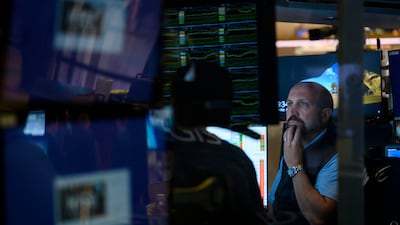Stock markets mostly fell on Friday as a much stronger-than-expected US jobs report raised the prospect that the Federal Reserve will maintain its aggressive monetary policy to combat inflation.
The benchmark S&P 500 ended only 0.2 per cent lower after recovering from an early slide as investors reacted to the report. This showed that US employers added 528,000 positions, defying all expectations of a slowdown, official data released on Friday showed.
The broad-based S&P 500 dipped 0.2 per cent and the tech-rich Nasdaq Composite Index shed 0.5 per cent.
Non-farm payrolls jumped 528,000 in July, data from the Labour Department showed. Employment in the month before was revised up to a 398,000 gain. The unemployment rate dropped to 3.5 per cent, matching a five-decade low.
The blistering data suggests the economy may not be in a recession, as feared. But it also undercuts investors’ speculation that a slowing economy may mean a peak for inflation soon.
That means the Fed may not let up on its aggressive rate rises to combat inflation as early as hoped. And much of Wall Street still revolves around expectations for rates.
“It’s a reminder for investors on how uncertain Fed policy is going forward and the strong jobs market data shows just how far the Fed has to go,” said Charlie Ripley, senior investment strategist at Allianz Investment Management.
The Fed announced historic interest rate increases to cool the economy amid the highest rise in costs in more than 40 years.
Fed chairman Jerome Powell said another large increase could be appropriate as it looks to calm inflation, without driving the economy into a recession.
Mr Powell and the White House have pushed back against the notion that the US entered a “technical recession” after data in July showed gross domestic product had shrunk for a second consecutive quarter.
The White House has frequently pointed to other economic factors such as the labour market as to why the US is not in a recession. Treasury Secretary Janet Yellen said a true recession shows a “broad-based weakening of the economy”.
In Europe, London equities ended the day down 0.1 per cent one day after the Bank of England unveiled a half-point interest rate increase and forecast UK inflation topping 13 per cent on surging domestic energy bills.
The BoE's rate increase followed more aggressive monetary policy from the European Central Bank and the Fed as authorities address rampant inflation after Russia's invasion of Ukraine.
Frankfurt's DAX declined 0.7 per cent and Paris' CAC 40 slid 0.6 per cent at the close of trading.
Asian stock markets, which closed before the US jobs data was released, settled higher. Tokyo's Nikkei 225 rose 0.9 per cent, Hong Kong's Hang Seng climbed 0.1 per cent and the Shanghai Composite improved 1.2 per cent.

